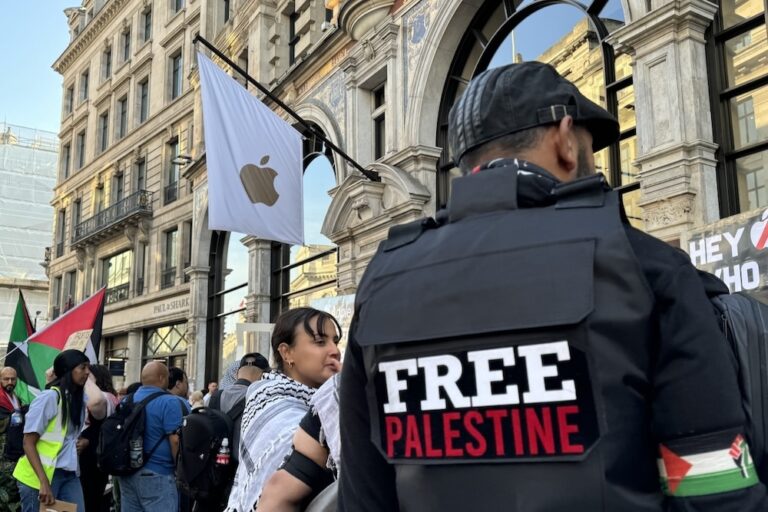From increased surveillance technologies to gender based online violence, a new report from The Arab Center for the Advancement of Social Media - 7amleh - sheds light on how a rise in digital rights violations against Palestinians is impacting their rights to privacy, assembly, and freedom of expression.
This statement was originally published on 7amleh.org on 21 April 2020.
The Arab Center for the Advancement of Social Media published #Hashtag Palestine, an annual report about violations of Palestinians’ digital rights. The report shows how digital rights violations against Palestinians are increasing and being perpetrated by governmental authorities, technology companies and the Palestinian society.
- Israeli surveillance technologies discovered to be illegally developed on Palestinians and exported worldwide.
- The Israeli government is utilizing digital smear campaign tactics to delegitimize Palestinian human rights organizations in coordination with Israel supporting non-state actors.
- Palestinian Authorities and Hamas continue to suppress critical political expression and public assembly arresting thousands of people each year.
- GoogleMaps, PayPal, Airbnb and other tech companies continue to violate international law and profit from operating in illegal Israeli settlements.
- In response to increasing digital rights violations, Palestinians are resorting to self-censorship. The voices of youth, women and members of the queer community are increasingly oppressed.
In 2019, Palestinians continued to have their rights severely impacted by oppressive Israeli policies and practices that include coordination with governmental institutions, civil society organizations and private companies. This includes the Israeli government, NSO Group and AnyVision, whose surveillance tactics have resulted in countless arrests, assaults and even extrajudicial killings in Palestine and worldwide. The Israeli government also published campaign materials to be used by Israel supporting non-state actors to spread hate and misinformation about Palestinian human right defenders online.
The Palestinian Authority used tactics of intimidation and censorship resulting in increased suppression of freedom of expression in the West Bank. This included the blocking of 59 websites utilizing the controversial Cybercrimes Law and the arrest of hundreds of people for their posts on social media. Hamas continued to severely constrain the political rights of Palestinians in Gaza to silence or arrest opponents, journalists and critics. In particular, during demonstrations against the high cost of living in March 2019, Hamas arrested, detained and assaulted several journalists and activists for covering peaceful political assembly.
Technology companies continue to discriminate against Palestinians. Social media companies are utilizing erroneous artificial intelligence that discriminates against Palestinian and Arabic content under pretexts of ‘technical errors,’ hate speech, violence and extremist content. In many cases, Facebook took down large amounts of Palestinian-Arabic content during times of political or social tension while leaving up hate speech in Hebrew directed towards Palestinians. As 7amleh’s research found, every 64 seconds there is a hate speech post directed towards Palestinians on Facebook.
Palestinians are also being denied access to major E-Commerce platforms such as PayPal, while operating for Israeli settlers in illegal settlements in the West Bank. Similarly, Google Maps is continuing to enable navigation to Israeli settlements, while failing to recognize the State of Palestine on its maps, and privately and publicly arguing that their map is a-political. Airbnb, which initially decided to change their policy and stop enabling settlers to use their platform, withdrew their decision under pressure from Israel supporting legal organizations.
As a result of the increases in rights violations, there is a chilling effect in Palestine and people are increasingly practicing self-censorship, reducing their digital engagement online, and limiting political expression. This includes youth, women and members of the queer community who have experienced countless instances of violence online and offline in the past year.



